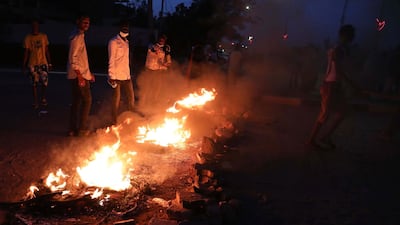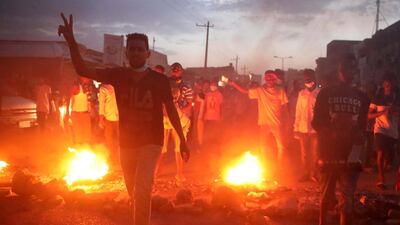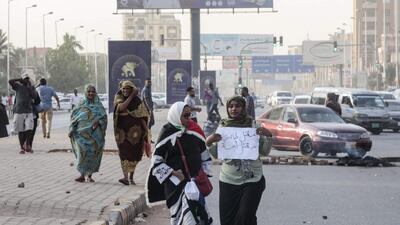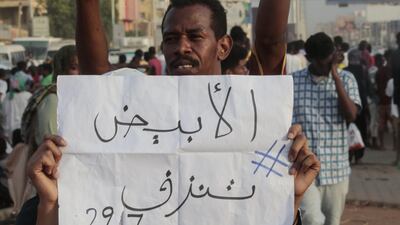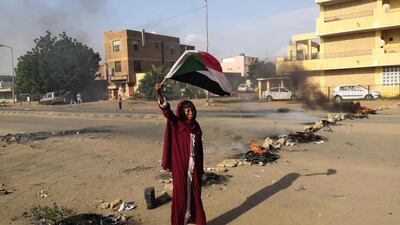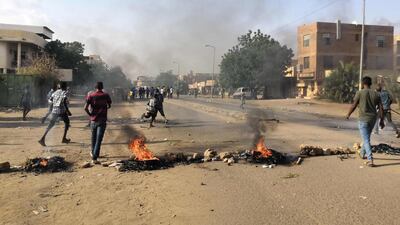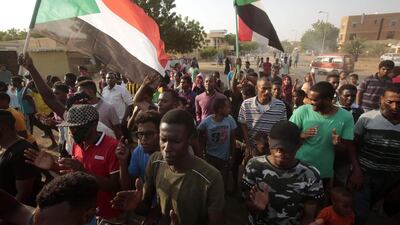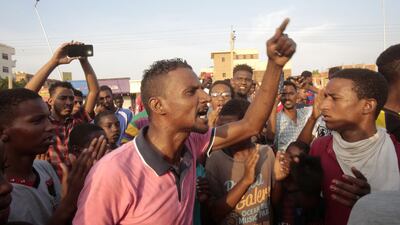The shooting of four school pupils earlier this week was "regrettable", the head of Sudan's ruling military council said as he renewed calls to finalise negotiations on a political transition.
At least four children and two others were shot on Monday at a protest about fuel and bread prices in central Sudan's Al Obeid.
Opposition groups called for nationwide protests after the children’s deaths, although the turnout was limited.
On Monday, Gen Abdel Fattah Al Burhan told state television that he hoped a deal between the military council he heads and the main opposition coalition could be reached "as soon as possible".
“What happened in Al Obeid and before are all regrettable,” he said.
“No one accepts the death or killing of any Sudanese person, and this may be one of the motives prompting us to sign as soon as possible to bring life back to normal."
More talks between the two sides on the transition to a new sovereign council were due to take place on Tuesday but were postponed after the shooting.
“The military council’s delegation is ready to begin negotiations at any time,” Gen Al Burhan said.
Six people, at least four of whom were pupils, were shot dead on Monday when security forces broke up their protest in Al Obeid, about 400 kilometres south-west of Khartoum, opposition doctors said.
The Forces of Freedom and Change coalition of opposition groups accused military and paramilitary forces of opening fire on the high-school pupils.
The Governor of North Kordofan state, Gen Al Sadiq Abdallah, said infiltrators had subverted a peaceful demonstration and attacked a bank branch before trying to attack another, state news agency Suna reported.
Gen Al Burhan said the protests in Al Obeid had deviated from their course and that protesters attacked markets and banks.
He said he could not confirm who shot the schoolchildren and that the matter was still under investigation.
The military council has ordered schools nationwide to be closed for an indefinite period starting on Wednesday after demonstrations by pupils.
"Killing a student is killing a nation," chanted hundreds of schoolchildren, dressed in their uniforms and waving Sudanese flags, as they took to the streets of Khartoum against the killings in Al Obeid.
Only dozens protested on Tuesday on Sitteen Street, a main thoroughfare in the capital Khartoum, carrying photos of the victims. Dozens more demonstrated in other parts of the capital.
A member of an opposition-linked pharmacists’ committee said pupils and adults also went out in protest on Tuesday in Al Obeid, the state capital of North Kordofan.
He said he had accompanied a delegation from the opposition who visited on Monday to console victims’ families and visit the wounded.
The coalition called for those responsible for the deaths to be held accountable and for the military council to immediately agree on the details of a new transitional authority.
“I am outraged by the deaths of protesters including schoolchildren in the city Al Obeid,” African Union Commission chairman Moussa Faki Mahamat tweeted on Tuesday.
“The right to peaceful assembly and the safety of all citizens, especially children, must be upheld.”
The US embassy in Khartoum also condemned the violence on Tuesday.
“The use of live ammunition is never an appropriate response to a peaceful demonstration," it said.
"This tragic event makes even more urgent the formation of a civilian-led transitional government that is broadly supported by the Sudanese people.”
The military council has been ruling Sudan since generals ousted veteran president Omar Al Bashir on April 11.
Long-stalled negotiations over the path towards the transition collapsed altogether when security forces broke up a protest camp outside the Defence Ministry on June 3, killing dozens of people.
But Ethiopian and African Union mediators were able to bring them back to the table and they signed a political accord on July 17.
They have been wrangling over the details of a constitutional declaration since.
